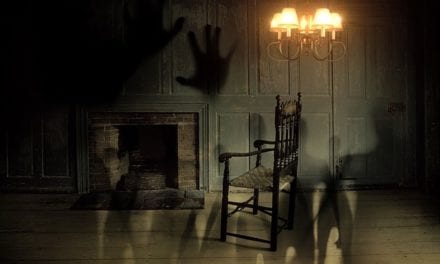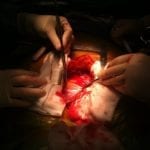Thump
The bright sun lent a cheery atmosphere to the brief funeral. The three persons in attendance, the digger, the minister, and the director had no real connection with the deceased, and they were more interested in the weather than in the disposal of Frank G. Martin. They believed that burying people was boring, tedious work, and sunny days made it bearable.
It only took a few minutes and then the director and minister were pacing off the stone path leading up and over the hill. The sounds of the digger’s shovel blade fell into a slow rhythm. The minister said what a nice day it had come to be after all.
The digger’s shovel rose and fell as a strange thumping noise came from the casket, which was half-buried in the grave. He froze, nearly losing his shovel in the hole.
He listened.
There it was again. Absolute terror shot through the poor digger and he backpedaled, lost his shovel, and fell down. He screamed.
Almost out of sight, the director and the minister were far enough away that one man might have continued on and disregarded the digger’s scream as an inconsequential splinter, but there were two of them, able to discuss what that sound was, and so, they talked about it a bit before turning back.
The digger was scrambling over the mound of fresh brown dirt in half leaps. He could still hear the thumps behind him and he squealed, “No. No.” His dark trousers and shirt were smeared with dirt as he plunged over the pile. He slid down and landed, sitting up in the grass, looking back at the grave.
“Reginald? What are you doing?” Buttoning his gray linen jacket, the director stopped on the lane and frowned. “Have you been drinking?”
“I think he’s hurt himself.” The minister rushed forward past the grave. He latched onto the digger’s arm. “Here, let me help you.”
Thump.
This time all three of them heard it. No one moved.
Thump, thump.
The digger shrieked and took off running. He galloped through the tombstones so fast that a lost tennis shoe twirled up into the air behind him. Taking refuge behind a marble crypt, he bellowed, “It’s a ghost! I heard it. There’s a ghost!”
The minister was flabbergasted. He was convinced there was some explanation for the strange noise coming from the casket. Rigor mortis, post mortem spasms, or some other logical reason. He took a long step toward the digger. He said gently, “Just calm down. There is no ghost.”
The director’s bright blue eyes twitched nervously. The dark hair over his temples glistened with perspiration. His hands trembled as he retrieved a copy of the death certificate from an inside breast pocket. He compared the name on the paper with the tombstone. As long as the two names matched, the funeral home was not liable for any mistake. That was the law.
The director listened closely to the intermittent thumping coming from the grave. To him, it sounded exactly as though someone were still alive in there. Highly improbable, yet he was convinced this was so. He replaced the death certificate and patted it. Luckily, he knew the law in a case like this. And the law was on his side.
The minister abandoned the digger’s plight and moved toward the grave. He became convinced that someone was still alive inside that coffin, that someone was not only thumping now, but that someone was screaming. The minister’s hands trembled and he felt awful.
“He’s in there,” the minister said. “He’s still alive.” Thick hands wringing, he worried for the victim of this tragedy, and he fretted for his own reputation. After all, the minister had been the witness and sanctifier of this macabre event. He had sent a man off to Heaven, and now that fellow was thumping and screaming to come back. What did that say about a man of the cloth? It said that he had allowed someone who wasn’t dead to be buried in a hole—that’s what it said.
The digger screamed in fright, “I saw him! He’s dead! I saw him dead.”
“He was certified,” the director added.
“He’s obviously alive now.” The minister stared at the cloudless sky, seeking strength.
Thump! A muffled plea came from the casket, “Can you hear me? Help! I’m in here.” Thump! “Help, get me out!”
The digger whined, “Reverend Carlson, I saw him when William took him out of the cooler. That man down there is dead. You have to believe me.”
Narrowing his eyes, the director ran through the possibilities that might lead to a man being buried alive. The key was William, the director’s incompetent nephew who had been known to skip the embalming on several occasions. The funeral home’s outlay for chemicals was the lowest it had been in twenty years and the director had been hard-pressed to find a good argument to criticize William’s laziness.
Now the law wasn’t on his side, the director realized. William’s lack of professionalism could not only get the boy fired, but the legal liability of his actions might be costly to the funeral home. Surely the negative publicity itself would inflict irreparable harm to their reputation. The director paced a few steps and stopped, struggling to collect his thoughts. He decided that he would contact the coroner, the one who was really responsible for all this. With any luck, the director could push the blame off on her.
Kneeling next to the open grave, the minister cupped a hand and called, “We can hear you. Just hold on.” A flurry of noise came from the casket. The man inside was frantic and terrified.
Feet dragged over the grass as the digger began to come back. Dread filled his voice. “I tell you, that man was dead.”
“We have to help him. Please.”
The director used his cell phone to call Shirley Campbell, the senile ninety-year-old coroner. She was the only doctor in the valley and most everyone went to the hospital in Memphis because of her surliness.
The director stepped away from the grave and argued with the coroner in hisses. He waved a hand at the minister’s whine about saving a man’s life. The coroner swore up and down that Frank G. Martin had succumbed to alcohol poisoning. Yes, she had done her job right. She yelled at the director and hung up.
The man in the coffin seemed to have worn himself out. His voice was weak. “Please . . . me out. Please help me.”
“Yes!” The minister motioned at the shovel and told the digger, “Get that.”
“That’s a ghost down there.”
Constraining his frustration, the minister said evenly, “You and I are going to save this man’s life. There is no ghost. There is a man dying in there.” His eyes went from the digger to the director on the path. “And you too. He’s running out of time and we all have to work together.”
The digger’s unruly bangs flopped over his haunted eyes as he whipped his head back and forth. He took a long step back. “I can’t even hear it anymore. I can’t hear anything.”
The coroner’s refusal to respond to the situation left the director in a peculiar spot. He had technically fulfilled his own legal obligation by making the phone call. There was nothing in the law about double checking the contents of a coffin. The law stated that in the event of unusual circumstances during a burial, the coroner’s office was to be notified. And hadn’t the director done that? He said loudly, “I don’t hear a thing.”
There was still noise coming from the coffin, but now it was a defeated patter, like rain on a roof.
His chest heaving, the digger proclaimed, “There was a ghost. It’s gone.”
“What?” The minister stared in disbelief.
“Look, Reverend.” The director caught the other man’s gaze. “Think about this for one minute.”
“There’s nothing to think about! We have to save that man’s life.”
“You, me, and the home, we’ll all look like fools. And what about Shirley? Do you want to drag her through the mud?”
“We are talking about a man’s life!” Frantic, the minister scrabbled around and came up with the shovel. His foot slipped and he accidentally kicked dirt into the grave. He righted himself awkwardly.
“Are we?” The director advanced forward and kicked at the mound of dirt. More dirt slid into the hole. “The man is dead.”
“My God!”
“He’s dead.” The director wrestled the shovel away from the minister. The director was determined to end this. He had done everything legally possible to fix things—and now the man was dead—the law said he was dead.
The minister collapsed into a heap. He crawled aimlessly. Pain and horror ripped at his face and tears hung over his eyes. “No. I’m begging you.”
The digger strode back to the grave and held out a hand. He grinned as the hard shovel handle smacked into his callused palm. “Man’s dead.” Ghost or man, whatever it was, it was quiet now. The digger wanted to just bury the thing and forget this ever happened. A shovelful of heavy dirt thumped onto the coffin, then another.
“No.” The minister bowed his head and began weeping.
A terrible scream pierced the air. The man in the coffin screamed a name. It was loud and clear—it was the director’s name. He screamed it because it was the last thing he would ever scream and he knew that the director was there.
The director lost his nerve. His voice was like ice. “Stop.” He was looking at the tears streaming down the minister’s face and he was hearing his own name shouted from the depths of Hell. It was too much to bear. “Reggie, stop.”
“I don’t care!” the digger screamed back. “He’s dead and he’s going to stay that way!” He pushed and chopped at the dirt furiously. The dirt piled over the coffin. He kept shoveling dirt and his breath ripped through the air.
“No, Reggie.” The director couldn’t believe this was really happening. And it was partly his fault. “We can’t.”
The hole was almost filled. Triumph sat in the digger’s voice, “That was a ghost scream. And now it’s gone.”
The minister staggered away. He got sick. Stumbling and weaving, he found the lane and left.
“No.” The director felt weak. He could see the filled hole; it was too late.
The digger patted the dirt with professional care. “That’s not the first ghost I ever heard. This whole place is full of ghosts. You don’t know, but I do.”
Shaking his head sadly, the director shuffled away from the grave. His black shoes became plastered with dirt but he didn’t care. Hard banging went on in his chest. He could not believe what had happened. They had buried a man alive, and that man knew the director’s name. He would tell God. And God would know what the director had done.
His hands had soil on them and the director dirtied his pants trying to wipe them clean. He didn’t care about the pants. He cared about the man in the grave knowing his name—he cared about going to Hell.
The digger was smoking a cigarette. The director, from several yards away, could smell the stink and he retched. Moving further down the row of graves, he came to poor Amelia Johnston’s final resting place. The director looked at the sky and asked God’s forgiveness, reminding God that just the day before he had provided Amelia with a very proper burial. That travesty back there, that was the digger’s fault. Hadn’t the director tried to stop the digger?
The digger was cackling about ghosts again. His claims that he’d heard ghosts all over the cemetery were ridiculous. The director cringed at the man’s primitiveness. There were no ghosts. There were only people like poor Amelia. The director had helped Amelia, and he’d helped her family accept the sad fact that their daughter had gone to God. That’s what the director did, he helped families. This is what I do, Lord.
Ignoring the grass stains and the dirt, the director slipped to his knees and began to pray. He prayed for God to forgive him for hiring that digger. The director’s ears pricked as he heard the digger traipsing away, dragging his shovel, tossing a whistle into the air. He had buried a man alive and now he was whistling merrily. That digger was crazy.
As the high-pitched whistle died away in the distance, the director sighed with relief. He hated that sound. It was the sound of rebellion against God. The cemetery was supposed to be a calm, quiet place where families bid farewell to their loved ones. It was a sacred place and the director had a sacred duty to protect it. And perhaps he had been chosen by God Himself to be there.
The director’s heart skipped and his eyes widened for a moment. He thought he had heard something. Something that could easily be misconstrued as the echo of a sound far away or the beating of his own heart. No, he told himself, this is only my imagination. But he heard that terrible noise once more and he cringed. Mouth flapping soundlessly, he stared at Amelia’s grave in horror.
It came again. A thump.






























